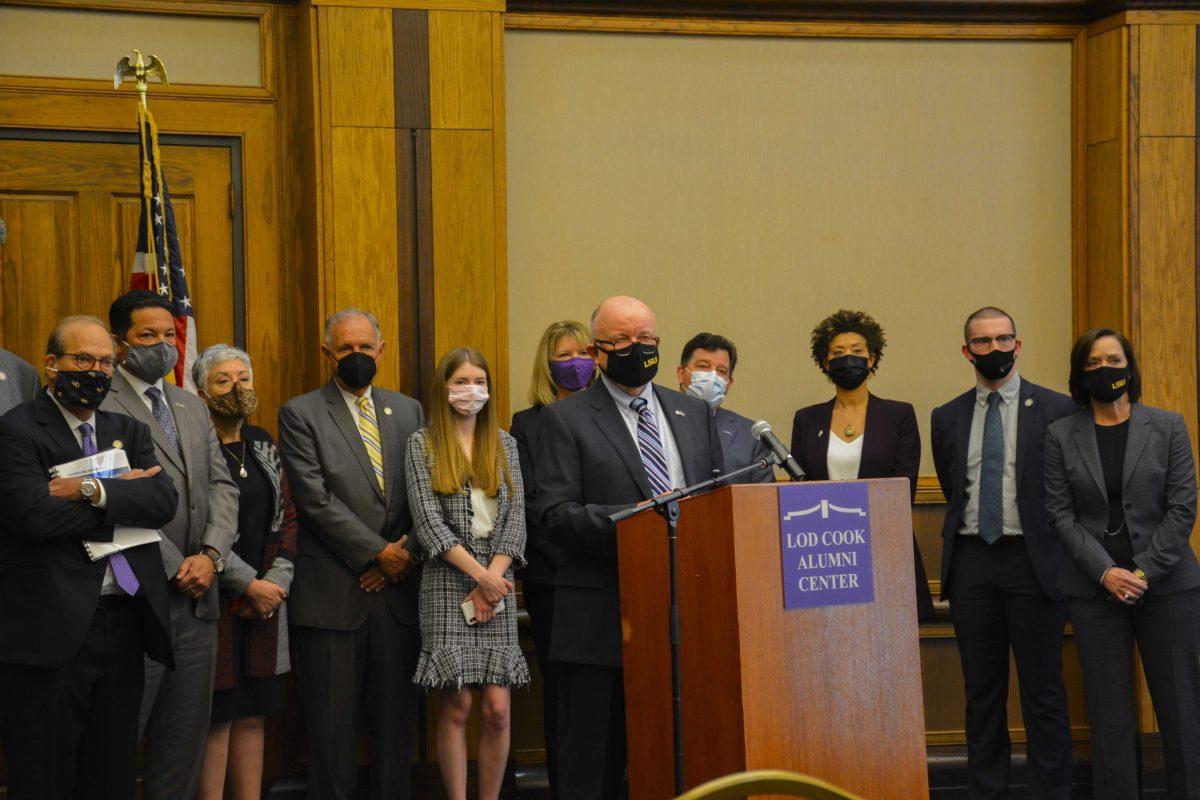When it comes to serving sexual violence survivors, the university chooses the bare minimum – or less – over and over again.
This pattern of disregard isn’t incidental to the Title IX system, but foundational. The most recent outcome of that pattern is the university’s failure to hold those that perpetuated the trauma of survivors accountable.
Recent public records requests from WBRZ reveal that Senior Associate Athletics Director for Student Services Miriam Segar and Executive Deputy Athletic Director Verge Ausberry worked during their unpaid suspensions from the university.
Segar and Ausberry were put on 21 and 30 day suspensions without pay respectively for serious Title IX reporting violations documented in the Husch Blackwell report.
Among other errors, Ausberry failed to report a direct admission of domestic violence from football player Drake Davis, a decision Husch Blackwell said “could have led to catastrophic consequences.”
Segar handled Title IX matters for athletics in house, at odds with university policy and proper practices. Husch Blackwell found that Segar failed to report and document Title IX cases as required, including a rape accusation against former football player Derrius Guice.
The university’s cowardly response to these dangerous Title IX missteps reveal a disregard for the seriousness of the offenses committed by senior athletics employees. Not only did Interim President Tom Galligan issue slap-on-the-wrist punishments, but he failed to even enforce them.
Even more telling is that Segar and Ausberry knew perfectly well that their emails could – and likely would, considering the publicity of their suspensions – be subject to public records requests. And they knew that such a request would reveal that they were, in fact, conducting university business during their so-called suspensions.
And yet, they didn’t care. They knew the university would continue to protect them, and their confidence seems entirely warranted.
The entire framing of the Title IX scandal by Galligan and the LSU Board of Supervisors was crafted to avoid holding anyone at the university accountable. Those responsible for the brunt of Title IX failures, they argued, were long gone, and those that remained did the best they could under impossible circumstances.
To be clear, the diagnosis of years of Title IX failures as an institutional problem is accurate. For its entire history, LSU Title IX has been characterized by too few staffers, far too little funding, miscommunication from administrators and poorly worded policy. The university’s Title IX system is, without a doubt, a fundamentally broken institution.
But we must not forget that that institution has had architects and enablers, and that some of them still collect a six-figure salary from the university.
Sweeping domestic violence from a football player under the rug cannot be excused by a misunderstanding of policy, and enabling abuse against students should have consequences – real, enforced consequences.
Each new headline confirms what has been clear from the start: the university’s Title IX response is not driven by justice or accountability, but by fear of a damaged reputation. To the university, the past few months have not been a reckoning, but a pesky PR scandal full of inconvenient truths.
The reaction from the university to these public revelations has been so transparently superficial. Higher ups point to severe underfunding and confusing policy with horror, as if these issues haven’t been raised to and dismissed by administrators for years (a point stressed several times by Husch Blackwell). A new, shiny action plan is touted, simply promising students what should have always been a given: a Title IX office compliant with federal law and basic morality. And the university issued suspensions to Segar and Ausberry, knowing the missing pay would hardly be a dent to their salaries and that the punishment would not be enforced anyway.
This most recent display of apathy from the university is frustrating, but hardly surprising. Nothing will fundamentally change in the university’s culture as long as its motives and priorities remain corrupted.
But the university must realize this: this community does not share its indifference for Title IX accountability. To students and survivors, this is not a temporary PR problem, but an unshakeable betrayal by an institution that is supposed to protect them.
Claire Sullivan is an 18-year-old coastal environmental science sophomore from Southbury, CT.
Opinion: Segar, Ausberry suspension violations characteristic of superficial Title IX response
June 22, 2021
Thomas C. Galligan Jr., LSU Interim President, speaks to the reporters about the Title IX review findings on Friday, Mar. 5, 2021 at Lod Cook Alumni Center on 3838 W Lakeshore Dr.





